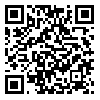Pajouhan Scientific Journal, Winter, In Press
Back to the articles list |
Back to browse issues page
1- Shandiz Institute of Higher Education, Mashhad, Iran , melikadelkhak@gmail.com
2- Hekmat Razavi Institute of Higher Education, Mashhad, Iran
2- Hekmat Razavi Institute of Higher Education, Mashhad, Iran
Abstract: (177 Views)
Background and Objectives: Executive functioning develops during the first six years of life and becomes more complex. It is a crucial component of childhood that can influence all aspects of a child's life and contribute to their success. The present study aimed to determine the effectiveness of Montessori games on the executive function of preschool children in Mashhad, Iran.
Materials and Methods: This quasi-experimental study employed a pre-test/post-test design and a control group. The statistical population consisted of all preschool children aged 5 to 6 years in Mashhad, Iran, in the academic year 2019-2020. In total, 32 children were selected by purposive sampling and randomly assigned to either the experimental or control group. Participants completed the Barkley Deficits in Executive Function Questionnaire (2012) with the assistance of their parents and teachers. The experimental group participated in 10 sessions of Montessori games, while the control group received no intervention. Data analysis was performed using analysis of variance (ANOVA) in SPSS software (version 24).
Results: According to the results of ANOVA, the executive function deficit scores in the post-test of the two groups, with a significance level of 0.027, showed significance difference between the two groups.
Conclusion: According to the research result, it can be concluded that Montessori games were effective in the executive function of preschool children and can be used in kindergartens, schools, and clinics.
Materials and Methods: This quasi-experimental study employed a pre-test/post-test design and a control group. The statistical population consisted of all preschool children aged 5 to 6 years in Mashhad, Iran, in the academic year 2019-2020. In total, 32 children were selected by purposive sampling and randomly assigned to either the experimental or control group. Participants completed the Barkley Deficits in Executive Function Questionnaire (2012) with the assistance of their parents and teachers. The experimental group participated in 10 sessions of Montessori games, while the control group received no intervention. Data analysis was performed using analysis of variance (ANOVA) in SPSS software (version 24).
Results: According to the results of ANOVA, the executive function deficit scores in the post-test of the two groups, with a significance level of 0.027, showed significance difference between the two groups.
Conclusion: According to the research result, it can be concluded that Montessori games were effective in the executive function of preschool children and can be used in kindergartens, schools, and clinics.
Type of Study: Research Article |
Subject:
Psychology and Psychiatry
Received: 2025/02/6 | Accepted: 2025/03/30
Received: 2025/02/6 | Accepted: 2025/03/30
Send email to the article author
| Rights and permissions | |
 |
This work is licensed under a Creative Commons Attribution-NonCommercial 4.0 International License. |






